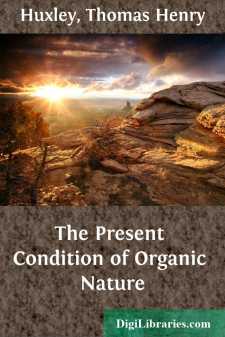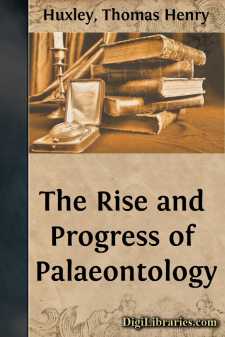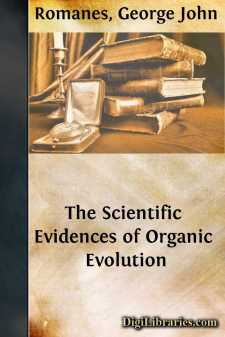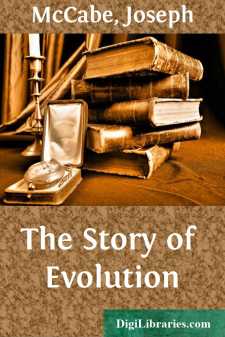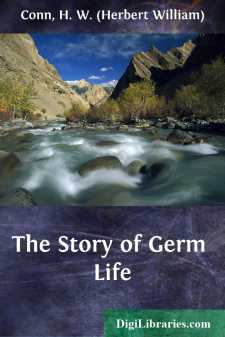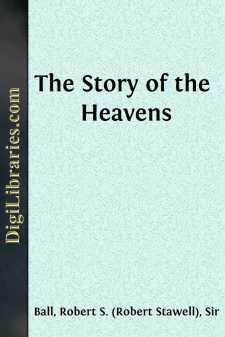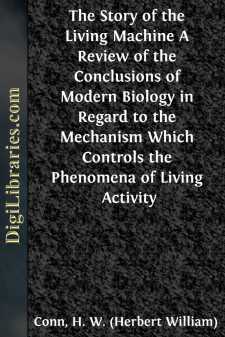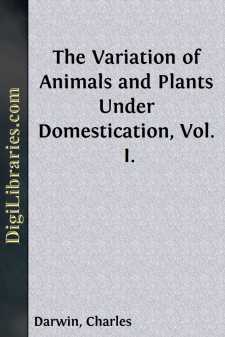Science
- Astronomy 18
- Biology 40
- Chemistry 13
- Electricity 1
- General 38
- History 6
- Light 1
- Paleontology 2
- Philosophy & Social Aspects 1
- Physics 3
- Relativity 2
- Study & Teaching 1
- Waves & Wave Mechanics 1
Science Books
Sort by:
THE PRESENT CONDITION OF ORGANIC NATURE. When it was my duty to consider what subject I would select for the six lectures [*To Working Men, at the Museum of Practical Geology, 1863.] which I shall now have the pleasure of delivering to you, it occurred to me that I could not do better than endeavour to put before you in a true light, or in what I might perhaps with more modesty call, that which I...
more...
That application of the sciences of biology and geology, which is commonly known as palaeontology, took its origin in the mind of the first person who, finding something like a shell, or a bone, naturally imbedded in gravel or rock, indulged in speculations upon the nature of this thing which he had dug out—this "fossil"—and upon the causes which had brought it into such a position. In this...
more...
by:
Robert Boyle
INTRODUCTORY To the following Treatise. O give the Reader an account, Why the following Treatise is suffer’d to pass abroad so maim’d and imperfect, I must inform him that ’tis now long since, that to gratify an ingenious Gentleman, I set down some of the Reasons that kept me from fully acquiescing either in the Peripatetical, or in the Chymical Doctrine, of the Material Principles of mixt Bodies....
more...
THE SCIENTIFIC EVIDENCES OF ORGANIC EVOLUTION. Although it is generally recognised that the Origin of Species has produced an effect both on the science and the philosophy of our age which is without a parallel in the history of thought, admirers of Mr. Darwin's genius are frequently surprised at the ignorance of his work which is displayed by many persons who can scarcely be said to belong to the...
more...
by:
Joseph McCabe
CHAPTER I. THE DISCOVERY OF THE UNIVERSE The beginning of the victorious career of modern science was very largely due to the making of two stimulating discoveries at the close of the Middle Ages. One was the discovery of the earth: the other the discovery of the universe. Men were confined, like molluscs in their shells, by a belief that they occupied the centre of a comparatively small...
more...
CHAPTER I. BACTERIA AS PLANTS. During the last fifteen years the subject of bacteriology [Footnote: The term microbe is simply a word which has been coined to include all of the microscopic plants commonly included under the terms bacteria and yeasts.] has developed with a marvellous rapidity. At the beginning of the ninth decade of the century bacteria were scarcely heard of outside of scientific...
more...
CHAPTER I. THE ASTRONOMICAL OBSERVATORY. Early Astronomical Observations—The Observatory of Tycho Brahe—The Pupil of the Eye—Vision of Faint Objects—The Telescope—The Object-Glass—Advantages of Large Telescopes—The Equatorial—The Observatory—The Power of a Telescope—Reflecting Telescopes—Lord Rosse's Great Reflector at Parsonstown—How the mighty Telescope is...
more...
CHAPTER I. IS THE BODY A MACHINE? The problem before us in this section is to find out to what extent animals and plants are machines. We wish to determine whether the laws and forces which regulate their activities are the same as the laws and forces with which we experiment in the chemical and physical laboratory, and whether the principles of mechanics and the doctrine of the conservation of energy...
more...
by:
Edward Everett
TWO NEW INSTITUTIONS OF SCIENCE; THE SCENES WHICH ATTENDED THEIR CHRISTENING. In the month of August last, two events took place in the city of Albany, which have more than an ephemeral interest. They occurred in close connection with the proceedings of a Scientific Convention, and the memory of them deserves to be cherished as a recollection of the easy way in which Science may be popularized and be...
more...
by:
Charles Darwin
INTRODUCTION. The object of this work is not to describe all the many races of animals which have been domesticated by man, and of the plants which have been cultivated by him; even if I possessed the requisite knowledge, so gigantic an undertaking would be here superfluous. It is my intention to give under the head of each species only such facts as I have been able to collect or observe, showing the...
more...


